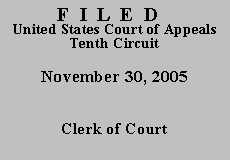

| UNITED STATES OF AMERICA,
Plaintiff-Appellee, |
|
| v. | |
| MARVIN JOHN COBB,
Defendant-Appellant. |
(D.C. Nos. CV-04-1026 WPJ/ACT and CR-03-244 WPJ)
|
Cobb, who has a prior state felony conviction, pled guilty to possession with intent to distribute marijuana in violation of 21 U.S.C. § 841, and was sentenced to the statutory minimum sentence of sixty months' incarceration. Cobb did not appeal his conviction or sentence.
On September 10, 2004, Cobb filed a § 2255 petition, claiming ineffective assistance of counsel and involuntary guilty plea. The district court referred the matter to a magistrate judge, who recommended that Cobb's petition be dismissed. The district court adopted the magistrate judge's report and recommendation, overruled Cobb's timely objections, and denied Cobb's request for habeas relief. Cobb requested a COA as to his claims of ineffective assistance of counsel and involuntary guilty plea. On April 28, 2005, the district court declined to grant a COA, but granted Cobb's motion to proceed in forma pauperis.
Unless the petitioner first obtains a COA, no appeal may be taken from a final order disposing of a § 2255 petition. See 28 U.S.C. § 2253(c)(1)(B). A COA may issue "only if the applicant has made a substantial showing of the denial of a constitutional right." 28 U.S.C. § 2253(2)(c). In determining whether Cobb has satisfied this burden, this court undertakes "a preliminary, though not definitive, consideration of the [legal] framework" applicable to each of his claims." Miller-El v. Cockrell, 537 U.S. 322, 338 (2003). To be entitled to a COA, Cobb need not establish that his appeal will succeed. Instead, he must "prove something more than the absence of frivolity or the existence of mere good faith." Id. (internal quotations omitted).
Based upon our review of the record on appeal, we conclude that Cobb is not entitled to a COA because no reasonable jurist would disagree with the district court's resolution of the issues in Cobb's habeas petition.
1. Ineffective Assistance of Counsel
Cobb, who is a Vietnam veteran allegedly suffering from post-traumatic stress disorder, claims that his counsel was ineffective for failing to argue that his mental condition was a mitigating factor that should reduce his sentence. The only support in the record for Cobb's claim, however, are Cobb's own statements during his sentencing hearing that he "suffered from panic attacks about a week and half to two weeks prior . . . ." Notably, the district court rejected Cobb's statements in this regard. Aside from his statements at sentencing, Cobb has not offered any evidence to show that he suffered from diminished capacity at the time of his offense.
Cobb additionally maintains that his counsel was deficient for failing to move for a downward departure. The magistrate judge, however, found that Cobb's counsel was concerned about invalidating the plea agreement by filing a motion for a downward departure. Further, pursuant to the terms of the plea agreement, Cobb agreed that he would not seek a downward departure.
The district court held that Cobb failed to demonstrate that his attorney's conduct was deficient pursuant to Strickland v. Washington, 466 U.S. 668, 687 (1984). The district court also held that Cobb failed to show that his counsel's performance prejudiced his defense. As to his arguments regarding diminished capacity and a downward departure motion, Cobb could not establish prejudice because the judge sentenced him to the statutory minimum of sixty months.
No reasonable jurist could conclude that Cobb made a substantial showing of a violation of his constitutional rights in his ineffectiveness claims.
2. Involuntary Guilty Plea
Cobb asserts that his guilty plea was involuntary because he conferred with his attorney for only twenty minutes about the agreement, and because he did not read the agreement.
The district court held that Cobb's plea was constitutionally valid because it was voluntary and intelligently given. See Bousley v. United States, 523 U.S. 614, 618 (1998). The record does not support Cobb's allegation that his guilty plea was involuntary. At the plea hearing, Cobb acknowledged that he understood and signed the plea agreement. The plea agreement stated that, in signing it, Cobb represented that his guilty plea was "freely and voluntarily made and not the result of force or threats or promises apart from those set forth in the plea agreement." Plea Agreement, at 6.
No reasonable jurist could disagree with the district court's resolution of Cobb's claim regarding the voluntariness of his guilty plea.
Cobb's request for a COA is DENIED, and this matter is DISMISSED.
Entered for the Court
Mary Beck Briscoe
Circuit Judge